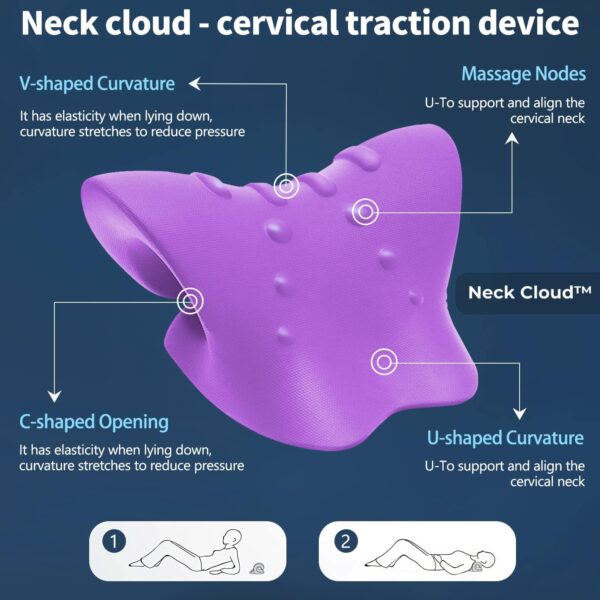Neck Cloud: Ingenious Support for Discomfort Relief and Better Posture
Neck Cloud: Ingenious Support for Discomfort Relief and Better Posture
Blog Article
The Influence of Stress And Anxiety on Neck Pain: Methods for Minimizing Stress and Pain
In today's busy world, it's no key that stress and anxiety has actually come to be a prevalent factor in the start and worsening of neck pain. Join us on a journey to unwind the effect of tension on neck discomfort and discover effective means to ease pain and enhance total high quality of life.
Understanding Stress-Related Neck Discomfort
Stress-related neck pain can materialize as tension, stiffness, or pain in the neck and shoulder area. The link between tension and neck discomfort exists in the body's physiological reaction to anxiety, which can result in muscular tissue tension and tightness in the neck muscular tissues.

Identifying Common Tension Areas
Regularly experienced by individuals under anxiety, stress locations in the body can give important understandings right into the physical indications of emotional pressure. One typical stress area is the neck, where tension often shows up physically. Stress headaches, rigid neck muscular tissues, and limited variety of motion prevail signs of stress-related neck tension. The shoulders are another usual location where tension accumulates. Tension can cause the muscles in the shoulders to tighten up, resulting in discomfort and discomfort. Furthermore, the top back is vulnerable to stress build-up, particularly in individuals who experience chronic stress and anxiety. Poor pose and extended sitting can worsen tension around. The jaw is also a typical area for stress-related stress, as lots of people clench their jaw or grind their teeth when emphasized. Recognizing these common tension areas can help individuals recognize the physical signs of stress and anxiety and take actions to address them before they intensify into chronic pain or discomfort.
Executing Leisure Strategies
To efficiently take care of stress-related tension in the body, implementing leisure techniques is important. Relaxation techniques are useful devices for minimizing neck discomfort triggered by stress and anxiety. Deep breathing exercises can help soothe the mind and unwind stressful muscular tissues in the neck and shoulders (neck cloud). Practicing mindfulness meditation can also be useful in relieving anxiety and advertising relaxation. Dynamic muscle leisure, where you methodically strained and afterwards unwind different muscle groups, can pop over to these guys launch built-up stress in the neck location. Furthermore, tasks like yoga exercise and tai chi include both physical activity and leisure, making them effective techniques for decreasing anxiety and neck discomfort. Taking regular breaks throughout the day to stretch and take a break can prevent muscle mass tightness and tension from collecting. By incorporating these leisure techniques into your day-to-day routine, you can assist take care of anxiety levels, lower stress in the neck, and alleviate discomfort associated with stress-induced neck discomfort.
Including Self-Care Practices
Incorporating self-care techniques is vital for preserving total wellness and handling stress-related neck pain successfully. Participating in regular physical activity, such as mild stretching workouts or yoga exercise, can assist reduce stress in the neck and shoulders. Practicing great posture throughout the day and taking constant breaks from prolonged resting or display time can also prevent pressure on the neck muscle mass.
In addition, prioritizing appropriate rest and browse around this web-site establishing a constant rest routine can contribute substantially to lowering tension degrees and advertising leisure. Producing a calming bedtime routine, such as checking out a publication or taking a warm bath, can assist prepare the mind and body for peaceful rest. Additionally, keeping a balanced diet regimen rich in nutrients and staying moisturized can support general health and decrease inflammation that may worsen neck discomfort.
Incorporating mindfulness methods, such as deep breathing workouts or meditation, can aid handle tension and advertise leisure. Taking some time for oneself, participating in hobbies, and establishing borders to safeguard personal time are also vital facets of self-care that can contribute to decreasing anxiety and minimizing neck discomfort.
Seeking Specialist Aid
How can individuals effectively address relentless neck discomfort that is impacting their day-to-day live and wellness? Seeking expert aid can be a crucial action in handling and minimizing neck discomfort. Consulting with health care experts such as chiropractic practitioners, physical specialists, or orthopedic experts can give valuable understandings and tailored therapy plans. These experts can perform comprehensive assessments to diagnose the underlying root causes of neck pain and suggest ideal interventions.
Chiropractics physician specialize in spine adjustment techniques to enhance positioning and decrease tension in the neck location. Physical specialists use targeted workouts and stretches to strengthen muscular tissues, improve adaptability, and improve overall neck feature. Orthopedic experts can supply sophisticated clinical treatments such as shots or medical choices for severe instances of neck discomfort.
Conclusion

Stress-related neck discomfort can materialize as tension, rigidity, or pain in the neck and shoulder area. The connection in between stress and anxiety and neck pain exists in the body's physiological response to anxiety, which can result in muscle mass stress and tightness in the neck muscles. Stress migraines, stiff neck muscle mass, and restricted array of activity are typical signs of stress-related neck stress. By integrating these relaxation methods right into your daily routine, you can assist manage tension levels, decrease stress in the neck, and minimize discomfort associated with stress-induced neck discomfort.

Report this page